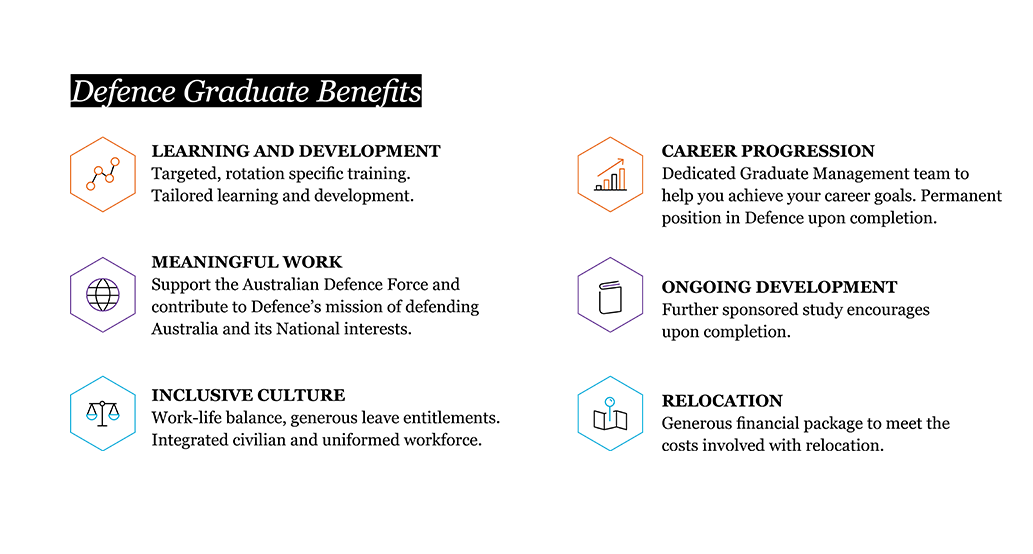Department of Defence
Naval Civilian Engineer Development Program
Opportunity expired
Opportunity details
- Graduate Job or Program
- APS 4: $68,442 pa + 15.4% superannuation. Upon successful completion of the program, graduates will advance to the APS 6: $82,282 pa +15.4% superannuation.
- Apply by 18 Apr 2020

The Naval Civilian Engineer Development Program (CEDP) offers a challenging, inspiring and unique work environment. The program ensures you receive a holistic development program, giving you the opportunity to strive both personally and professionally.
Navy requires professional civilian engineers from a broad range of disciplines to enable Navy to acquire, maintain, sustain and upgrade ships and submarines of the Royal Australian Navy (RAN). You will assist in the delivery of technical requirements, specifications, design and tender evaluations and have the opportunity to participate in tests and trials. This work includes the analysis of failures and recommending solutions. The ships and submarines of the RAN are unique and challenging platforms that combine the systems for delivering maritime capability integrated with the crews' workplace, recreation and accommodation in a single environment.
The Naval CEDP runs for three years and includes six work rotations of six months each at various locations. These include:
One industry rotation (outside the Department of Defence) that can be completed in Canberra or other locations within Australia.
- One rotation at another Group within The Department of Defence, such as the Capability Acquisition and Sustainment Group or the Defence Science and Technology Group.
- Four rotations within Navy Group.
Navy is a workplace that values its people and supports their contribution and innovative ideas. The Naval CEDP will develop the core skills required to be successful in the role and provides excellent opportunities for professional development through mentoring and education. Navy is a diverse and inclusive organisation, with a focus on the wellbeing of its staff through encouraging a work-life balance.
The Naval CEDP provides engineering graduates with the opportunity to grow and develop a professional career providing optimum exposure to a variety of on and off the job training. Our engineers are given opportunities to maintain and broaden their engineering skills, to attend specialist training in their given disciplines and to achieve and maintain appropriate levels of professional status (Chartered). Graduates are also provided with general training courses that have been designed to develop your core competency skills and providing you with the tools to become one of our future leaders.
The Naval CEDP is recognised by Engineers Australia and is structured to help engineers achieve appropriate levels of professional competency, for recognition toward Chartered Status. Chartered Status is a professional credential recognised by the government, business and the general public worldwide. As a Naval CEDP graduate, we will continue to fund your membership with Engineers Australia or other appropriate professional body whilst you continue to meet the requirements of Navy and are working towards or maintaining Chartered Status.
Degree types: Engineering (specialising in Naval Architecture, Communications Systems, Chemical, Electronics, Electrical, Materials, Mechatronics, Computer Science, Software and Cyber related technologies, Systems, Mechanical, Communications Networks.). New to our program for 2020 we are looking for graduates with disciplines in ICT.
Technology areas include radar, command and control systems, networks, satellite and terrestrial communications, navigation, integrated control systems, sonar, escape and rescue, structures and corrosion protection, stability and seakeeping, damage control, signatures, ballistic protection and shock hardening, armament, fluid power transfer, air conditioning, lifting equipment, power generation and distribution, propulsion, environmental protection.
Quick Details
Salary: APS 4: $68,442 pa + 15.4% superannuation. Upon successful completion of the program, graduates will advance to APS 6: $82,282 pa + 15.4% superannuation
Program: 3 years – 6 x 6 month rotations
Location: Canberra
Reviews
They are different every day but I have had the opportunity to draft emails, documents and undertake academic research as part of developing doctrinal policy.
- Document review, editing and drafting. - Handling correspondence for projects - Attending meetings - Stakeholder engagement (both internal and external)
Policy writing, decision making, liaising with other areas of Department . These roles and responsibilities are very rewarding
About the employer

Department of Defence
4.1
1,000 - 50,000 employees
Government & Public Service
Bring your unique skills and experiences to a world of opportunity at Defence.
Pros and cons of working at Department of Defence
Pros
Opportunity to learn and exposure to a vast array of experiences. Sense of pride in working on behalf of the Australian people and for the defence of the country.
The support for learning development opportunities and ongoing exposure to networking opportunities.
The department is very flexible when it comes to hours, including making ample arrangements to work from home if necessary.
I have had the opportunity to draft emails, documents and undertake academic research as part of developing doctrinal policy.
They are supportive and are good mentors in teaching the internal procedures that otherwise would not be shared if not directly exposed to them.
Cons
Workplace culture is heavily dependent on the dedication of the supervisors and senior leaders which varies depending on the work area.
When all workplace employees are working on-site there is often a shortage of desks which is inconvenient for all involved.
Can be very slow to hear updates.
There is a good mix of women, ethnic minorities, etc., but this seems to be very aggregated in certain groups/services—not so much integrated or dispersed across the department.
I am unsure of my current knowledge or capacity to comment on their sustainability efforts.